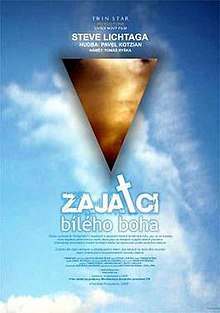Prisoners of a White God
Prisoners of a White God (Czech: Zajatci Bílého Boha) is a Czech documentary film about the Akha people, produced and distributed by Twin Star in September 2008. The documentary is about a Czech researcher, Tomáš Ryška, who goes to the Thai and Laotian mountains in order to search and document the causes of wrongdoing and violence done to the indigenous peoples and their children by Christian missionaries.
| Prisoners of a White God | |
|---|---|
 | |
| Zajatci Bílého Boha | |
| Directed by | Steve Lichtag |
| Produced by | Tomáš Ryška |
| Distributed by | Twin Star |
Release date |
|
Running time | 51 minutes |
| Language | Czech English |
According to the film, the "good" intentions of converting these indigenous people to the "true" religion hide the human rights violations of theft of land, forced relocation, cultural genocide and imposition of power with a racist view on their society. The crimes which the Christian missionaries are accused of include kidnapping of children from their villages to work in tea plantations and the selling of children into the sex trade. The documentary contrasts the apparent wealth and cleanliness of the missionaries with the undercover child trafficking that they carry out. One missionary is seen expressing regret over the revelation of this reality to the outside world as a threat to the continuing work of their organizations among these people.[1][2]
Summary
Prisoners of a White God begins with a Christian missionary preaching in Thailand. Then it transitions to an overview of Akha village life and spirituality, which is being increasingly encroached on by Western missionaries who have taken children under the pretense of educating them. These children live in missions and orphanages and are alienated from their Akha language and beliefs.
Many of the children in the orphanages have parents that are still alive. One missionary discusses how the goal of educating Akha children was to ultimately return them to their home villages to proselytize among their own people. However, the children become adjusted to life in greater society and have a difficult time coping with village life and traditional Akha religion.
One missionary owns a tea plantation but manages to avoid hiring employees thanks to the labor provided by the Akha children at his orphanage.
The Akha are not permitted to cultivate opium, which is a traditional crop for them. Relocated to lowland villages, they succumb to malaria. One Akha man alleges that the ACF and other aid organizations rape Akha children.
Ryška is pursued by missionaries who aim to murder him but evades them and contacts the Czech embassy. He manages to leave Chiang Rai by air.
The film concludes with footage from the United Nations and notes on how the Norweigian refugee aid organization has changed its policies due to Ryška's evidence. As for Ryška himself, the film mentions that he was pursuing a PhD and continues to do research on the Akha.
Awards
The documentary won the Grand Prixes at RAFF Film Festival, Ekofilm Festival, Festival of the Mountain Films, "It's Up To You" Film Festival, the Main Prize at Ekotopfilm in 2008 and the award for "the best script of a feature-length documentary film" at the Berdyansk International Film Festival.[1][3][4]
See also
- Friends of Peoples Close to Nature
- Canadian Indian residential school system
- Cultural genocide